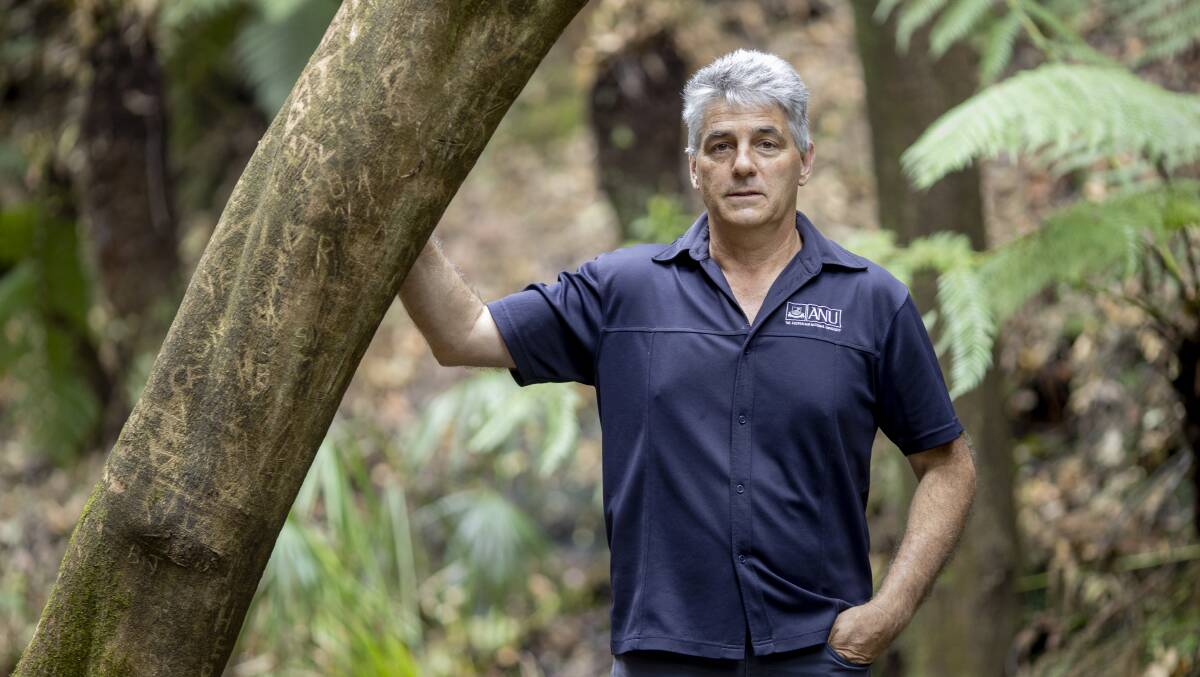A half century ago, a bored child looked out of the car window somewhere to the west of Canberra and got interested.
Subscribe now for unlimited access.
or signup to continue reading

The result is one of the clearest scientific voices on climate change and bushfires currently raising the alarm in Australia.
Professor David Lindermayer BSc, DipEd, PhD, DSc, FAA, AO of the Fenner School of Environment and Society at the Australian National University was once a curious child.
"My parents used to take these epic car drives in the days before DVDs on the back of seats, before the radio worked in the car - you couldn't pick up a signal 300 kilometres west of Canberra.
"There was nothing to do except look out of the window and look at landscapes, and see how it all fitted together."
A half century later, he feels it is all fitting together with increasing difficulty. His curiosity about the landscape and the environment has led to insight and authority on the bushfires and their aftermath.
As the immediate task of putting the fires out gives way to the politics, he is anxious that people don't get diverted from the truth by false information. He gives a special lecture at the University of Canberra about it on Tuesday evening.
If you want to ask somebody about what's happening with the climate, you don't ask a right-wing shock jock. You listen to a specialist scientist who studies climate.
- David Lindenmayer
"There's such a lot of ill-informed debate. Such a large proportion of discussion is factually wrong."
So who should we trust? "If you've got a problem with high blood-pressure, you go and see a doctor and then a specialist. They are science trained," he said.
"If you want to ask somebody about what's happening with the climate, you don't ask a right-wing shock jock. You listen to a specialist scientist who studies climate."
He thinks the debate has become falsely pitched as a choice between jobs and the environment - improving the environment means losing jobs. He thinks that, in fact, both could work together because there is a mass of opportunity in Australia to get into new green technologies - from solar farms to making electric cars.
So why don't we? "There are a lot of people scared about what an alternative life would be with alternative sources of energy."
He thinks part of the reason is sheer vested interests - coal companies and the politicians they are close to.
"There's a small rump of climate change deniers," he said.
The deniers are determined, switching the argument as parts of it are knocked down, he feels.
Now that the science shows that temperatures really are rising, the argument is switched to whether that is so out of the ordinary. When scientists answer that claim, in turn, the question becomes whether the rising carbon dioxide in the atmosphere is caused by human beings. And so on.
READ MORE:
He blames vested interests like coal companies and the politicians they are close to - "the power that you buy when you make large donations to political parties".
And he thinks there's been a lack of leadership. "Australia needs to play a leadership role," he said.
To the suggestion that Australia could stop burning coal and oil and the global problem would still be there, he says that Australia is ideally placed to lead others.
He cites the theory that big countries don't lead because they think they can get what they want by throwing their weight around. And small countries can't lead because they are small.
But medium sized countries - like Australia - have enough clout to persuade others.
He despairs of Australian politicians whom he thinks are too often "careerists" and not there to "make a difference".
He spent some time in Scandinavia and he remembers (perhaps idealistically, with the rosy tainted nostalgia for lost youth) a culture of politicians who were prepared to do deals with opponents. "In Denmark, people had some reverence for politicians who would work across the political divide rather than mud-slinging."
Despite his despair at Australian politics, he continues to argue for change, using his high public profile. When he sits on a bench in the Australian National Botanic Garden, complete strangers pass and thank him for his work.
Forests are his passion - and the loss of them is a great sadness. He says that there used to be 20 to 23 billion trees in the Murray-Darling Basin but today there are only about eight billion.
This matters because trees soak up carbon dioxide which otherwise would stay in the atmosphere, contributing to global warming.
"Is it any wonder we've got a problem? These things feed into the bigger problem of fire because we've dried out the continent; we've increased the temperature; we've generated massive emissions and reduced the ability to store carbon."
The curious child has turned into an angrier adult. He spells out the science loudly.
But he's not convinced that the politicians who could act really want to hear.
- The Krebs Lecture at the University of Canberra is designed to bridge the divide between scientists and policymakers. Professor Lindenmayer will speak at 6.30pm, Tuesday, February 18. Its title is, "From Landscape Transformation to Ecosystem Collapse - Key Insights from Long-term fire, Forest and Biodiversity Research".


